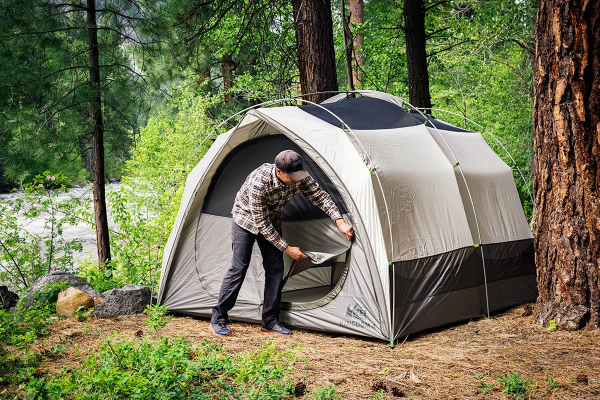Camping is a fantastic way to enjoy nature, disconnect from daily stress, and spend quality time with friends or family. If you’re planning an overnight camping trip, it’s essential to be well-prepared. This guide will provide you with a detailed list of everything you need for a successful camping experience.
Choosing the Right Campsite
Before gathering your gear, you need to select a suitable campsite. Consider the following factors:
Location
Proximity to water: Look for sites near lakes or rivers for easy access to water.
Accessibility: Make sure you can reach the site with your vehicle or by hiking.
Safety: Avoid areas prone to flooding or wildlife encounters.
Regulations
Permits: Check if you need a permit for camping in the area.
Fires: Some locations have restrictions on open fires.
Essential Camping Gear
Once you have your campsite chosen, it’s time to gather your gear. Here’s a comprehensive list of essential camping items.
Shelter
Tent
- Size: Choose a tent that accommodates the number of people and gear.
- Weatherproof: Ensure it’s waterproof and has a rainfly for protection.
- Footprint: A ground tarp can help protect the tent floor.
Sleeping Gear
- Sleeping Bag: Select a sleeping bag rated for the temperatures you expect.
- Sleeping Pad: This adds insulation and comfort.
- Pillow: You can bring a small pillow or stuff a jacket inside a stuff sack.
Cooking Equipment
Portable Stove
- Type: Choose between a propane, butane, or multi-fuel stove.
- Cooking Gear: Don’t forget pots, pans, and cooking utensils.
Food Storage
- Cooler: A cooler keeps perishable food fresh.
- Bear Canister: In bear country, a bear-proof container is essential.
Eating Utensils
- Plates/Bowls: Lightweight and durable options are best.
- Cutlery: Bring spoons, forks, and knives.
- Mugs: Consider insulated mugs for hot drinks.
Food and Beverages
Plan your meals ahead of time. Here are some suggestions:
Canned Goods: Beans, soups, and vegetables are easy to pack.
Snacks: Trail mix, granola bars, and dried fruits are great for energy.
Meats: Pack in your cooler and use ice packs to keep fresh.
Fruits and Vegetables: Choose hardy options like apples and carrots.
Water: Bring enough water for drinking and cooking.
Coffee/Tea: Consider instant coffee or tea bags for easy brewing.
Clothing
Dressing appropriately can enhance your camping experience. Consider the following:
Base Layer: Moisture-wicking shirts and underwear.
Insulating Layer: Fleece or down jackets for warmth.
Outer Layer: Waterproof and windproof jackets.
Hiking Boots: Sturdy boots provide ankle support and traction.
Sandals: Comfortable for relaxing at the campsite.
Hats: A wide-brimmed hat protects from the sun.
Socks: Wool or synthetic socks keep your feet warm and dry.
Gloves: Lightweight gloves are useful in cooler temperatures.
Personal Items
Don’t forget to pack personal items for hygiene and comfort.
Toothbrush/Toothpaste: Essential for dental hygiene.
Biodegradable Soap: Use it for washing hands and dishes.
Toilet Paper: Bring enough and store it in a waterproof bag.
Contents: Include band-aids, antiseptic wipes, pain relievers, and any personal medications.
Emergency Blanket: A space blanket can provide warmth in emergencies.
Navigation Tools
Knowing how to navigate your surroundings is crucial.
Paper Map: Always have a physical map as a backup.
Compass: Learn how to use it effectively.
Handheld GPS: Consider a portable GPS device for accurate navigation.
Lighting
Good lighting is vital for nighttime activities.
Headlamp: Provides hands-free illumination.
Extra Batteries: Always bring spare batteries for your devices.
Safety and Survival Gear
Being prepared for emergencies can make a difference.
Versatility: A multi-tool can handle various tasks, from cutting rope to opening cans.
Options: Bring waterproof matches, a lighter, or fire starter kits.
Tinder: Carry dry tinder like cotton balls or dry leaves.
Signaling: A whistle can help attract attention if you get lost.
Optional Camping Gear
Depending on your preferences and the type of camping, you may want to include some optional items.
Camp Furniture
Comfort: Lightweight and foldable chairs provide comfort around the campfire.
Portable Table: A small, collapsible table can make cooking and eating easier.
Recreation Gear
Rod and Tackle: If you plan to fish, bring your gear and licenses.
Daypack: A smaller backpack for day hikes from your campsite.
Trekking Poles: Helpful for stability on rough terrain.
Entertainment
Reading Material: Bring a book or an e-reader for downtime.
Card Games: Pack a deck of cards for evening entertainment.
Technology
Power Bank: Keep your devices charged for navigation or communication.
Capture Memories: Bring a camera or smartphone to document your trip.
Conclusion
Preparing for an overnight camping trip requires careful planning and the right gear. By following this guide, you’ll have everything you need for a safe and enjoyable experience in the great outdoors. Always remember to leave no trace and respect nature. Happy camping!
Related topics:
- Is the Coleman Sundome Tent Waterproof?
- What Does Camping Mean in Slang?
- Is Camping Safe? A Comprehensive Guide

